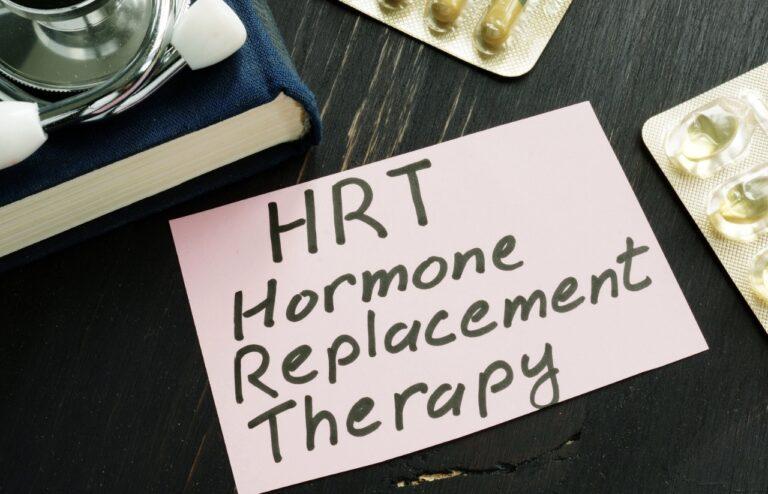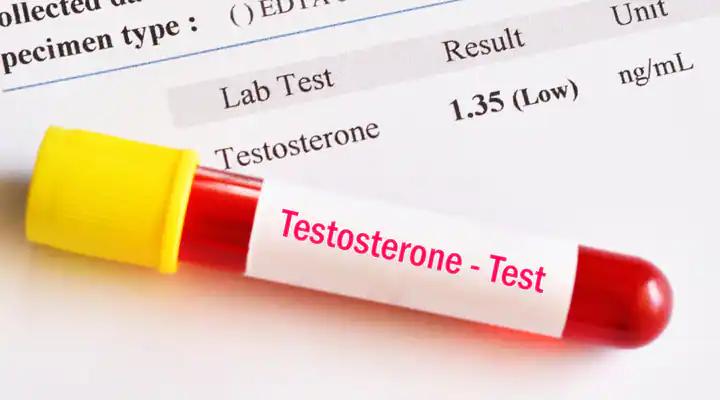
October 15, 2025 (Current Version)
October 15, 2025
March 28, 2025
Hormone replacement therapy (HRT) is a medical treatment indicated for individuals whose bodies are unable to produce sufficient hormones to maintain normal bodily functions. In men, testosterone plays a vital role in maintaining male characteristics and sexual function. When there are low testosterone levels, men may experience a range of symptoms, including a reduction in body hair and facial hair, lethargy, erectile dysfunction, low sex drive, and a low mood. HRT aims to restore primary and secondary male sexual characteristics and alleviate the problems associated with unstable testosterone levels.
In this comprehensive guide, we will explore the different aspects of hormone replacement therapy for men, including the signs of testosterone deficiency, treatment options, and considerations for choosing the most suitable method. We will also discuss lifestyle factors and psychological issues that may contribute to the symptoms commonly associated with “male menopause.”
Symptoms of low testosterone in men
Testosterone deficiency, also known as late-onset hypogonadism, can lead to various physical and emotional symptoms in men. While the decline in testosterone production is a natural part of ageing, a significant decrease in hormone levels can result in the following symptoms:
- Mood swings and irritability
- Loss of sex drive
- Erectile Dysfunction (problems getting an erection)
- Loss of muscle mass and reduced ability to exercise
- Fat redistribution, such as developing a large belly or “man boobs” (gynecomastia or breast enlargement)
- General lack of enthusiasm or low energy levels
- Difficulty sleeping (insomnia) or increased tiredness
- Poor concentration and short-term memory
- Reduced bone density/osteoporosis
- Hair loss
It is essential to identify the underlying cause of these symptoms to determine the appropriate treatment approach.
Understanding the “male menopause”
The term “male menopause” or “andropause” is often used in the media to describe the symptoms experienced by men in their late 40s to early 50s. However, this label can be misleading as it suggests a sudden drop in testosterone levels similar to what occurs during female menopause. In reality, testosterone levels decline gradually at a rate of about 1% per year from the age of 30 to 40, which is unlikely to cause significant problems.
While low levels of testosterone can contribute to the symptoms associated with “male menopause,” it is crucial to consider other factors such as lifestyle and psychological issues that may play a role.
Lifestyle and psychological factors
In many cases, the symptoms commonly associated with “male menopause” can be attributed to lifestyle factors or psychological problems. Stress, depression, and anxiety can contribute to erectile dysfunction, low sex drive, and mood swings. Additionally, factors like smoking, alcohol consumption, poor diet, lack of exercise, and low self-esteem can exacerbate these symptoms. Work or relationship issues, financial concerns, and anxieties about ageing can also contribute to psychological problems in men.
It is important to address these lifestyle and psychological factors alongside any hormonal considerations to ensure comprehensive treatment and symptom relief.
Late-onset hypogonadism: A potential cause
While lifestyle and psychological factors often play a significant role, there are cases where the symptoms of the “male menopause” may be caused by late-onset hypogonadism. Late-onset hypogonadism occurs when the testes produce few or no hormones, leading to a testosterone deficiency. This condition can be present from birth, causing symptoms such as delayed puberty and small testes. However, it can also develop later in life, particularly in men who are obese or have type 2 diabetes.
Diagnosing late-onset hypogonadism involves assessing symptoms and conducting blood tests to measure testosterone levels. If a testosterone deficiency is confirmed, hormone replacement therapy may be recommended to correct the deficiency and alleviate the associated symptoms.
Treatment options for testosterone replacement therapy
When it comes to hormone replacement therapy for men, there are various treatment options available. These options include:
- Three monthly injections
- Dermal gel applied daily and absorbed through the skin
- Implants placed under the skin, lasting several months
- Patches applied to the skin
- Tablets
The choice of treatment method depends on individual preferences and lifestyle considerations. It is essential to consult with a specialist in hormone therapy or an endocrinologist to discuss the different options thoroughly and determine the most suitable approach.
What are the potential side effects of hormone treatment for men?
Effect of HRT on the Prostate
One of the major concerns associated with testosterone treatment is its effect on the prostate. The prostate is an androgen-dependent gland, and testosterone supplementation has been shown to increase its size. However, studies have demonstrated that hormone replacement therapy does not significantly worsen lower urinary tract symptoms or urinary retention in men with benign prostatic hyperplasia (BPH). Some studies have even reported improvements in urinary symptoms after one year of HRT.
Furthermore, there is no evidence to suggest that hormone replacement therapy increases the risk of prostate cancer. Several longitudinal studies have failed to find an association between endogenous testosterone levels and the subsequent risk of prostate cancer. While testosterone replacement therapy may accelerate the development of prostate cancer in individuals who already have the disease, it does not appear to cause the development of prostate cancer in men without a pre-existing condition.
For men who have previously undergone treatment for prostate cancer, the usage of hormone replacement therapy is becoming more accepted. Studies have shown that testosterone replacement therapy does not increase the risk of cancer recurrence in hypogonadal men following radical prostatectomy.
Breast cancer and hormone replacement therapy
The association between hormone replacement therapy and male breast cancer is not well understood. While there is no known physiological link between testosterone and the development of breast cancer, high levels of testosterone may lead to increased aromatisation to an active derivative of estrogen, which could potentially stimulate breast tissue receptors and increase the risk of male breast cancer. However, the current evidence regarding this association is limited to case reports and retrospective reviews. Further research is needed to determine if there is a true association between hormone replacement therapy and male breast cancer.
Influence of hormone replacement therapy on red blood cell count
Hormone replacement therapy has been shown to increase haemoglobin levels through its effect on the production of erythropoietin. This increase in haemoglobin can improve symptoms of anaemia in men. However, one of the potential side effects of hormone replacement therapy is polycythemia, a condition characterised by an increased number of red blood cells. Polycythemia can lead to an increased incidence of vascular events such as stroke, myocardial infarction, and deep vein thrombosis. Therefore, it is important to monitor complete blood count (CBC) levels during hormone replacement therapy and adjust the dosage if necessary.
Relationship between hormone replacement therapy and obstructive sleep apnea
The association between hormone replacement therapy and obstructive sleep apnea (OSA) is not well understood. While some studies have suggested that there is no association between the two, others have shown that OSA occurs in men undergoing hormone replacement therapy and resolves when supplementation is stopped. More research is needed to determine the etiology of this association and the impact of hormone replacement therapy on individuals with OSA.
Consulting with a specialist
If you are experiencing symptoms of testosterone deficiency or considering hormone replacement therapy, it is recommended to consult with a specialist in hormone therapy or an endocrinologist. These healthcare professionals have expertise in managing hormone-related conditions and can provide personalized advice based on your specific needs and medical history.
During the consultation, the specialist will assess your symptoms, discuss your lifestyle and psychological factors, and conduct any necessary tests to determine the cause of your symptoms. They will then provide recommendations for appropriate treatment options, taking into account your preferences and lifestyle.
Conclusion
Hormone replacement therapy for men, also known as HRT, can be a valuable treatment option for individuals experiencing testosterone deficiency and related symptoms. While lifestyle and psychological factors can contribute to these symptoms, late-onset hypogonadism may also be a potential cause. Consulting with a specialist in hormone therapy or an endocrinologist is essential to determine the underlying cause of symptoms and explore appropriate treatment options.
Whether through injections, gels, implants, patches, or tablets, hormone replacement therapy aims to restore primary and secondary male sexual characteristics and alleviate the problems associated with unstable testosterone levels. Throughout the treatment process, it is important to prioritize privacy, dignity, and open communication with healthcare providers, ensuring a safe and comfortable experience.
If you are experiencing symptoms of testosterone deficiency or considering hormone replacement therapy, reach out to a healthcare professional for a comprehensive evaluation and personalised treatment plan tailored to your needs. HRT could be just what you need to improve your overall well-being and quality of life. Always inform your healthcare providers of all your medical conditions and the medication you take.
Sources
- Hormone replacement therapy for men – CUH
- The ‘male menopause’ – NHS
- Risks of testosterone replacement therapy in men – PMC
Medical Disclaimer
NowPatient has taken all reasonable steps to ensure that all material is factually accurate, complete, and current. However, the knowledge and experience of a qualified healthcare professional should always be sought after instead of using the information on this page. Before taking any drug, you should always speak to your doctor or another qualified healthcare provider.
The information provided here about medications is subject to change and is not meant to include all uses, precautions, warnings, directions, drug interactions, allergic reactions, or negative effects. The absence of warnings or other information for a particular medication does not imply that the medication or medication combination is appropriate for all patients or for all possible purposes.






